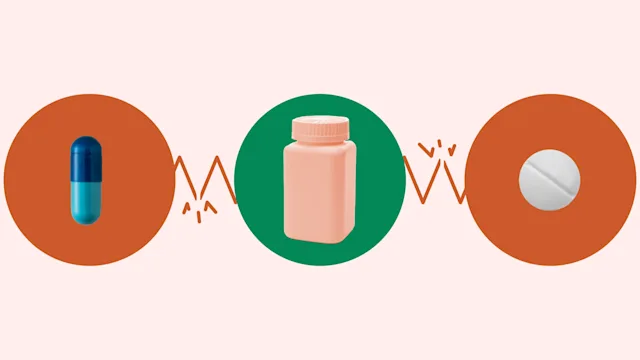Key takeaways:
Diltiazem extended-release (Cardizem LA, Cardizem CD, Cartia XT), metoprolol immediate-release (Lopressor), and metoprolol extended-release (Toprol XL) treat a heart condition called atrial fibrillation (AFib). They do this by slowing down your heart rate. Diltiazem also reduces how hard your heart contracts.
Both diltiazem and metoprolol are first-choice medications for AFib. But metoprolol is typically preferred if you also have a type of heart failure where your heart doesn’t pump enough blood to the body (reduced ejection fraction).
Diltiazem and metoprolol have some similar side effects, such as dizziness and low blood pressure. But people more commonly report swelling, stuffy nose, and constipation with diltiazem. More people report diarrhea, itching, and shortness of breath with metoprolol.
Save on related medications
Atrial fibrillation (AFib) is a type of abnormal heart rhythm (arrhythmia). In AFib, the heart beats either too fast or too slow. This can lead to several health complications, such as heart failure, blood clots, and stroke.
Diltiazem extended-release (Cardizem LA, Cardizem CD, Cartia XT), metoprolol immediate-release (Lopressor), and metoprolol extended-release (Toprol XL) are medications that treat Afib. But when comparing diltiazem and metoprolol, is one more effective than the other? How does your cardiologist decide which is best for you?
Here, we’ll discuss four major differences between diltiazem and metoprolol. We’ll also cover some of their similarities and how to save on these medications.
In this article, we’ll focus on oral diltiazem and metoprolol. However, both medications are available as intravenous (IV) products that may be given in a hospital when needed.
1. Diltiazem and metoprolol work in different ways
As mentioned, your heart beats irregularly in AFib. So medications that slow down your heart rate (like metoprolol and diltiazem) are beneficial. But they work in different ways.
Metoprolol is part of a group of medications called beta blockers. More specifically, it’s known as a cardioselective beta blocker. This means it blocks beta-1 receptors (binding sites) in your heart. This prevents certain chemicals from binding to these receptors. The end result is that metoprolol slows down how fast your heart beats (heart rate), improves blood flow, and reduces how hard your heart has to work.
Diltiazem is a part of a group of medications called calcium channel blockers. It works by affecting the way calcium moves in and out of your heart muscles and blood vessels. Too much calcium can cause your heart and blood vessels to work too hard, which is the case with certain heart conditions. When diltiazem blocks calcium channels, it decreases your heart rate. It also reduces how strongly the heart contracts (more so than metoprolol does).
All about atrial fibrillation: Atrial fibrillation (AFib) is a heart condition where your heart beats chaotically. Learn about the causes, symptoms, and how it’s treated.
AFib versus ventricular fibrillation (Vfib): These are two types of irregular heart rhythms, but they have some differences.
Blood thinners for AFib: One of the primary goals of treating AFib is to prevent strokes. Learn which blood thinners are typically recommended and why.
2. Metoprolol ER and diltiazem ER are taken once a day, while metoprolol IR is taken twice a day
For AFib, metoprolol ER and diltiazem ER are typically taken once a day. But metoprolol IR is typically taken twice a day in most cases. That’s because it doesn’t last long enough in the body to be taken once a day.
It’s best to take both forms of metoprolol with, or just after, a meal. This can help reduce side effects like nausea. Diltiazem can be taken with or without food.
Metoprolol ER and metoprolol IR only come as an oral tablet. If your metoprolol medication has a line down the middle of it (a score line), you can cut it in half if it helps you make the correct dosage.
It’s not as simple with diltiazem, however. Diltiazem ER is available in both tablet and capsule form. Some capsules can’t be opened, so they have to be taken whole (like Cardizem CD). Others are capsules that can be opened (like Taztia XT or Tiazac). The tablets (Cardizem LA) should be swallowed whole. Don’t chew or crush them.
3. Both metoprolol and diltiazem are effective, but metoprolol is preferred if you have a certain type of heart failure
Both metoprolol and diltiazem are considered both first-choice medications for controlling your heart rate with AFib. When comparing metoprolol versus diltiazem, which medication is best for you may depend on several factors.
One of the major determining factors for whether metoprolol or diltiazem is a better choice for your AFib depends on whether you have heart failure with “reduced ejection fraction” (HFrEF). Ejection fraction (EF) is a measure of how much blood your heart pumps out with each heartbeat.
If your EF is low (less than or equal to 40% of the typical EF), you’re said to have HFrEF. Because diltiazem can reduce how strong your heart contracts, it can worsen heart failure. Metoprolol is preferred for people with HFrEF.
If you don’t have HFrEF, your cardiologist will consider other factors when deciding between diltiazem and metoprolol. This includes other health conditions you have. For example, metoprolol can both increase blood glucose and mask signs of hypoglycemia (low blood glucose). So if you have diabetes, it’s possible that your prescriber may recommend diltiazem, which isn’t known to have these effects.
4. Diltiazem and metoprolol share several side effects, but there are some differences, too
Diltiazem and metoprolol have some similar side effects. These include:
Dizziness
Tiredness or fatigue
Low blood pressure
Abnormally slow heart rate
Worsening heart failure (more likely with diltiazem)
Headache
Rash
However, they have some different side effects, too. Diltiazem is more likely to cause lower limb swelling (edema), constipation, and stuffy nose. It can also rarely cause liver problems. Metoprolol may be more likely to cause diarrhea, itching, and shortness of breath. And as discussed above, metoprolol may mask the signs of hypoglycemia. It can also cause mood changes, such as depression.
Good to know: Recent research shows that diltiazem is more likely than metoprolol to cause bleeding in older adults when taken with certain anticoagulants such as apixaban (Eliquis) or rivaroxaban (Xarelto). These medications are commonly used in AFib, and diltiazem can block them from leaving the body and cause bleeding. So ask your pharmacist or prescriber to look for interactions before taking either medication. Giving them an updated list of your current medications will help them check.
Are there any similarities?
Besides sharing some side effects, these two medications have a few other things in common, too.
Diltiazem and metoprolol are prescribed off-label for AFib. This means that neither medication is FDA approved to treat AFib. Still, they’re considered first-choice medications for this condition.
They’re both considered “rate control” medications. In AFib, some medications can control your heart rhythm. These are called “rhythm control” medications. Others — like diltiazem and metoprolol — slow down your heart rate. These are called rate control medications.
They have some similar drug interactions. Both metoprolol and diltiazem have some drug interactions in common. For example, they both can interact with clonidine (Catapres), digoxin (Lanoxin, Digitek), and alcohol. But each medication also has unique drug interactions. As mentioned, giving your healthcare team an updated list of your current medications will help them check.
You should avoid both medications in some situations. Metoprolol and diltiazem should be avoided in some similar situations. For example, people with sinus bradycardia (low heart rate), certain types of heart block, and very low blood pressure shouldn’t take either medication. There may be other situations where one of these medications shouldn’t be used. Make sure your cardiologist has your full health history before starting one of these medications.
Can you take diltiazem and metoprolol together?
Not usually. Though there are some cases where calcium channel blockers and beta blockers are combined, it’s generally best to avoid the combination.
Both diltiazem and metoprolol can decrease your heart rate, so combining them can cause your heart rate to become dangerously low. Your blood pressure may also drop too low.
How to save
Diltiazem ER and metoprolol medications are available as generic medications. You can save on each with GoodRx.
Generic diltiazem ER capsules at certain pharmacies may be as low as $14.98 with a free GoodRx discount. And diltiazem ER tablets may be as low as $34.48 with a free GoodRx discount.
Generic metoprolol IR’s price at certain pharmacies is as low as $9.00 with a free GoodRx discount.
Generic metoprolol ER’s price at certain pharmacies is less than $46.77 with a free GoodRx discount.
The bottom line
Diltiazem extended-release (Cardizem LA, Cardizem CD, Cartia XT), metoprolol immediate-release (Lopressor), and metoprolol extended-release (Toprol XL) are used to treat atrial fibrillation (AFib). They’re both first-choice medications for slowing down your heart rate. Diltiazem also reduces the strength of your heart’s contraction.
Metoprolol is typically preferred if you have a type of heart failure where your heart doesn’t pump enough blood to the body. Both medications have some similar side effects such as dizziness and low blood pressure. But they also have different side effects, too. So talk to your prescriber about which medication may be best for you based on your individual preferences, medical history, and other medications you take.

Why trust our experts?


References
American Heart Association. (2022). What is an arrhythmia?
American Heart Association. (2023). Atrial fibrillation medications.
American Heart Association. (2023). Types of heart failure.
Joglar, J. A., et al. (2023). 2023 ACC/AHA/ACCP/HRS Guideline for the diagnosis and management of atrial fibrillation: A report of the American College of Cardiology/American Heart Association Joint Committee on clinical practice guidelines. Circulation.
Ray, W. A., et al. (2024). Serious bleeding in patients with atrial fibrillation using diltiazem with apixaban or rivaroxaban. JAMA.
Saedder, E. A., et al. (2019). Heart insufficiency after combination of verapamil and metoprolol: A fatal case report and literature review. Clinical Case Reports.














